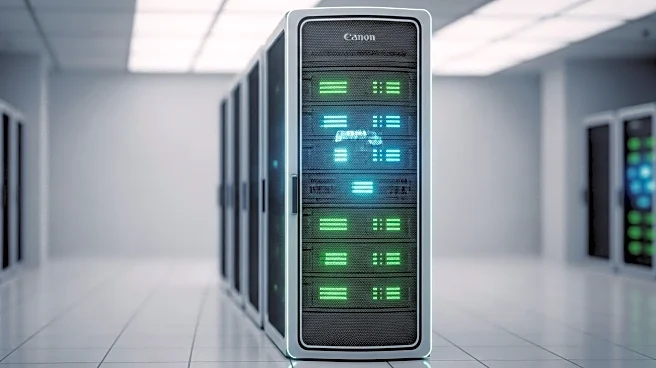What's Happening?
Harvard economist Jason Furman has revealed that U.S. GDP growth in the first half of 2025 was predominantly driven by investments in data centers and information processing technology. Furman calculated that without these technology-related investments, GDP growth would have been a mere 0.1% on an annualized basis. This underscores the critical role of high-tech infrastructure in shaping macroeconomic outcomes. Despite consumer spending traditionally accounting for two-thirds of GDP, the contribution from AI data-center buildout has surpassed it for the first time. Major tech companies like Microsoft, Google, Amazon, Meta, and Nvidia have invested heavily in data centers to meet the growing demand for artificial intelligence and large language models. This investment has significantly impacted GDP growth, with data center spending adding approximately 100 basis points to U.S. real GDP growth.
Why It's Important?
The findings highlight the increasing dependence of the U.S. economy on technology investments, particularly in data centers, to drive growth. This reliance raises concerns about the sustainability of economic expansion, especially as other sectors like manufacturing, real estate, and retail have contributed little or detracted from overall output. The surge in technology-led growth comes amid wider economic sluggishness, with job creation slowing and fears of a potential recession without technology investment. The substantial investments by tech giants in data centers reflect a shift in economic dynamics, where traditional sectors are overshadowed by the rapid growth of technology infrastructure. This trend could have long-term implications for economic policy and investment strategies.
What's Next?
The focus on data centers and technology infrastructure is likely to continue, with tech companies investing further to enhance computing capabilities. However, the sustainability of this growth model remains uncertain, as concerns about an 'industrial bubble' in data centers persist. Economists and policymakers may need to address the imbalance between technology-driven growth and the stagnation in other sectors. Future economic strategies might involve diversifying investments to ensure a more balanced and sustainable growth trajectory. Additionally, the impact of these investments on employment and wage growth will be closely monitored, as the economy navigates the complexities of technology-driven expansion.
Beyond the Headlines
The reliance on data centers for GDP growth raises ethical and economic questions about the concentration of economic power in the hands of a few tech giants. This could lead to increased scrutiny from regulators and policymakers concerned about monopolistic practices and the potential for market distortions. The environmental impact of massive data centers, including energy consumption and carbon emissions, may also become a focal point for sustainability advocates. As the economy becomes more intertwined with technology infrastructure, the cultural and societal implications of this shift will likely be explored, including the role of AI in shaping future economic landscapes.










